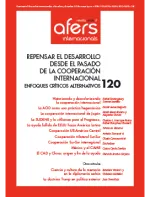For Japanese security: a critical view of Japanese cooperation

After the Second World War, Japan began paying war reparations and instituted a strategy of international positioning – based on international cooperation activities – that aimed to ensure the supply of natural resources to its production and trade. Economic security became the target of Japanese cooperation. Japan soon became a major donor, whose strategy has been permeated by its interests. Taking a critical perspective, this paper analyses the evolution of the Japanese cooperation strategy, in particular the changes promoted by the prime minister, Shinzo Abe. Its starting point is a review of the stages of Japanese cooperation (emphasising the outside interference the country has had to respond to), the underpinning of which has shifted from the principle of economic security via the principle of human security to its present greater focus on strategic security.
Key words: Japan, cooperation for development, critical approach, security
DOI: doi.org/10.24241/rcai.2018.120.3.51
>> The full text articles of this issue are available only in Spanish language